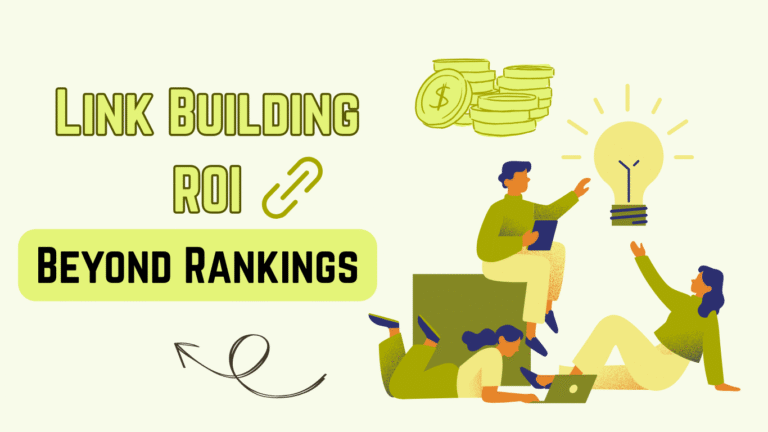We’ve rounded up the best email marketing platforms into one handy guide for businesses looking to maximize growth and engagement. While newer AI-powered tools are reshaping the industry, tried-and-true platforms still deliver excellent value and reliability.
It’s worth remembering that the right email marketing software can deliver an exceptional ROI. There are also plenty of free trials and affordable plans to help ease the investment. If you’re looking for an in-depth breakdown, scroll down. Check out these main marketing tools.
According to FirstPageSage, email marketing remains one of the most effective conversion channels, delivering average conversion rates of 2.8% for B2C brands and 2.4% for B2B companies. HubSpot also identifies that email marketing is the most effective ROI channel for B2C brands. Email marketing platforms are important tools for businesses.
Expert opinion
In the time it took you to read this sentence, 20m emails have been sent.
John Watton
Mailchimp
So popular for businesses of all sizes. Its AI-powered tools now assist users in drafting engaging content, suggesting headlines, and generating full campaign layouts that align with your brand style.
By using behavior-based triggers and customer data, businesses can send timely, relevant messages. Advanced segmentation and real-time analysis allow marketers to easily customize campaigns for audiences most likely to respond.
With access to various customizable templates and a built-in Creative Assistant, Mailchimp helps to create branded content. And because it integrates with more than 300 apps and services, Mailchimp manages marketing efforts across multiple channels.

What I Like
- Intuitive and beginner-friendly drag-and-drop email builder
- Generous basic free plan for smaller businesses (Mailchimp’s free plan allows for up to 500 contacts and 1,000 email sends per month)
- A wide range of features to support marketing strategies
- AI-powered tools to assist with content creation, including writing email copy
- Integrations with popular services like Shopify, WordPress, Zapier, and QuickBooks
- Detailed analytics and reporting
What I Dislike
- Limited automation on lower tiers
- Customer support is a frequent source of user complaints
- Strict policies, particularly regarding affiliate marketing
- The platform is not innovating as quickly as some of its competitors, which are rapidly introducing advanced features like a more integrated AI across all platforms
Read more Best AI Email Assistants for Teams
Brevo
Brevo is a full-fledged customer engagement platform for businesses. Instead of managing multiple tools for email, SMS, WhatsApp, live chat, and customer data, Brevo brings them all together in a single place.
The Aura AI system allows users to enrich customer profiles, segment audiences, and determine the best time to send each campaign. Its easy drag-and-drop email builder makes it possible to set up professional campaigns. Pre-built templates along with simple workflows help beginners and experienced marketers launch campaigns quickly.
In addition to email, Brevo provides advanced segmentation and a customer data platform to help businesses target the right audience. Features like birthday emails, abandoned cart reminders, and dynamic audience lists give marketers the tools to boost engagement and sales.
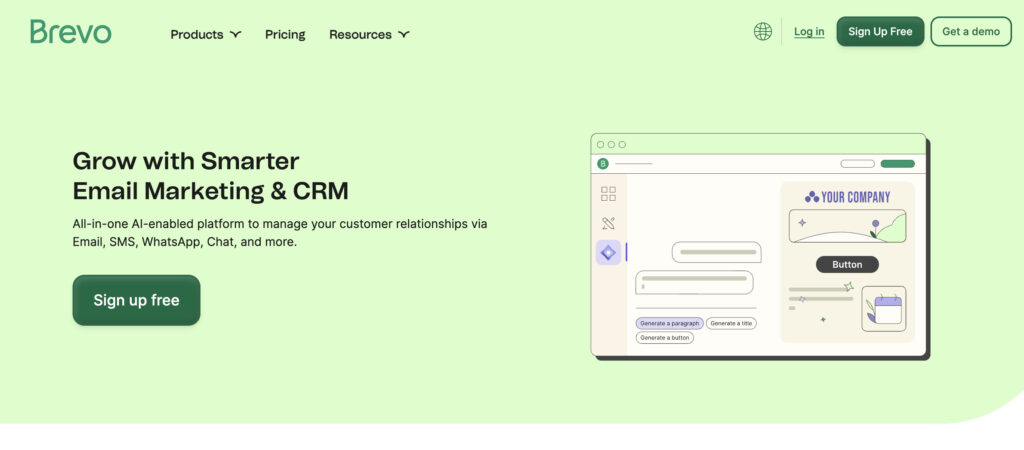
What I Like
- Includes a built-in CRM, marketing automation, transactional emails, SMS campaigns, WhatsApp messaging, and live chat
- Powerful marketing automation
- Built-in AI assistant
- Powerful transactional email capabilities for e-commerce and SaaS businesses
- Intuitive and easy-to-navigate user interface
What I Dislike
- Daily sending limit on the free plan (300 emails/day)
- Advanced features (A/B testing, landing page builders, multi-user access, etc) are only offered in higher-priced plans
- Fewer pre-made templates
- Learning curve for advanced features
MailerLite
The platform makes it simple for anyone to create great campaigns. With customizable content blocks and templates, you can design engaging emails, forms, and professional landing pages.
MailerLite allows users to build unlimited workflows. Pre-built templates make it easy to get started quickly. From newsletters and surveys to quizzes and pop-ups, the platform provides a wide range of tools to engage subscribers in interactive ways.
MailerLite is also well-known for its transparent, affordable plans for small businesses and startups.

What I Like
- One of the most cost-effective options
- Generous free plan allows for up to 1,000 subscribers and 12,000 monthly emails. It includes essential features: the drag-and-drop editor, automation builder, landing pages, and more
- User-friendly interface, easy-to-use drag-and-drop editor, a great choice for beginners
- All plans include a website builder, blog, and landing pages
- MailerLite’s automation builder is powerful and easy to use
What I Dislike
- Stricter account approval process (MailerLite is very careful to prevent spammers)
- Limited advanced automation
- The free plan does not include access to MailerLite’s template gallery
- Basic reporting and analytics
GetResponse
GetResponse has been helping businesses build and scale their email marketing. The platform now integrates advanced automation, AI-powered content creation, and predictive tools.
Built on OpenAI technology, its AI email generator can draft optimized copy, create subject lines, and design full email layouts quickly. With a drag-and-drop creator, GetResponse gives users all the tools they need to design professional, visually appealing campaigns.
GetResponse also offers ecommerce and monetization capabilities, including promo codes, paid newsletter subscriptions, and transactional emails. It’s a solution for generating direct revenue and building long-term customer relationships.
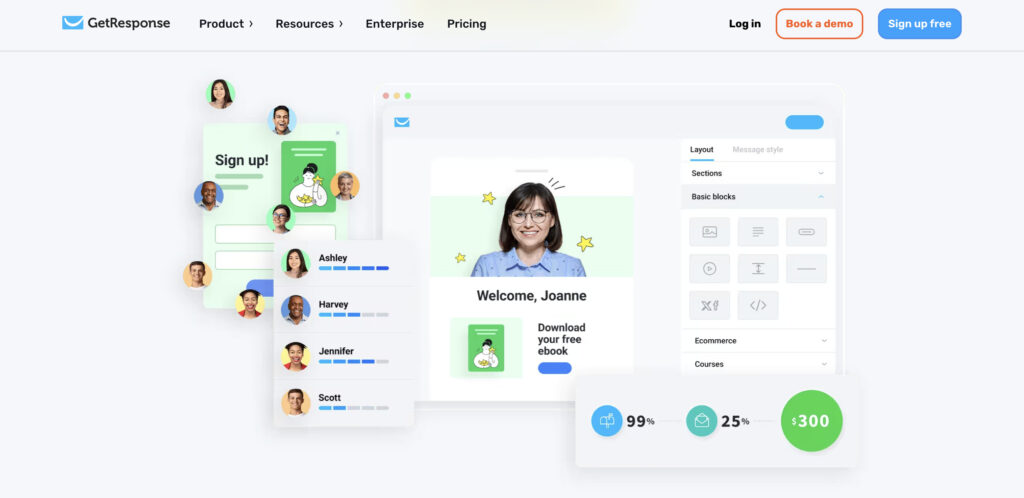
What I Like
- A full suite of marketing tools, with features like a website builder, landing page builder, conversion funnels, live chat, and webinar hosting.
- One of the most powerful and user-friendly automation builders
- AI-powered tools included
- The reporting features are excellent
What I Dislike
- Many of the most powerful features that make GetResponse an all-in-one solution are locked behind the more expensive plans.
- Because GetResponse offers so many features, the dashboard can feel cluttered
- Basic website and landing page builders
- Some pre-designed email and landing page templates feel outdated
ActiveCampaign
Moving beyond traditional automation, ActiveCampaign has become an autonomous marketing platform. At its core, ActiveCampaign is built around Active Intelligence, a suite of AI agents that handle content creation, strategy optimization, and performance analysis.
In addition, ActiveCampaign’s powerful automation engine allows businesses to create advanced customer journeys. Prebuilt workflows also make it simple for businesses to get started, while the visual automation builder supports full customization for more complex journeys.
Email marketing itself is deeply personalized. With advanced segmentation, conditional content, and AI-powered optimization, businesses can send highly relevant messages that resonate with individual subscribers.
Features like predictive sending ensure emails reach contacts at the most effective times, while dynamic personalization lets one campaign adapt automatically for different segments.
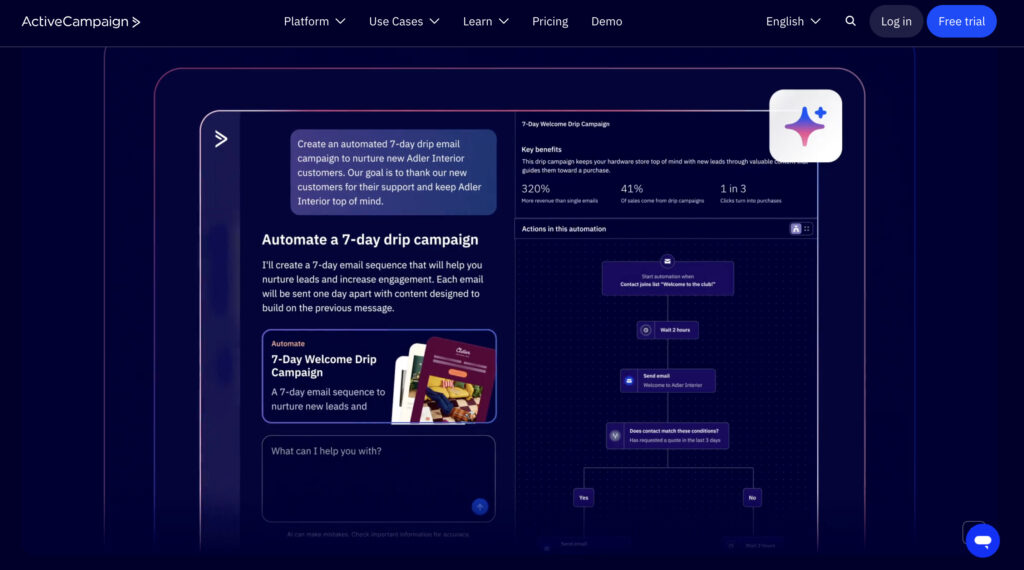
What I Like
- One of the most powerful and intuitive marketing automation builders
- Built-in CRM and sales automation. Its sales pipeline management and lead scoring capabilities are ideal for small to medium-sized sales teams.
- Deep segmentation and personalization. You can create lists and segments based on a contact’s engagement, demographics, site visits, and more.
- Integrated generative AI tools to assist with various tasks
- Connects seamlessly with a vast range of other services, including e-commerce platforms like Shopify and WooCommerce, CRMs like Salesforce, and a variety of other business tools.
What I Dislike
- Steeper learning curve
- No free plan
- Expensive pricing
- Basic landing page builder, not as powerful or flexible as dedicated tools
- Fewer built-in templates
Omnisend
Omnisend stands out as a marketing platform that combines email and SMS automation. Omnisend allows businesses to focus on delivering consistent, on-brand experiences across multiple channels.
Omnisend is especially built for ecommerce businesses. The platform integrates with Shopify, WooCommerce, BigCommerce, Wix, and other tools. This allows merchants to launch personalized, shoppable emails and SMS campaigns quickly, with features like dynamic product pickers, discount codes, and product recommendations.
With pre-built workflows covering welcome series, abandoned cart recovery, post-purchase follow-ups, and more, Omnisend automates the customer journey. Segmentation and personalization are equally strong. Businesses can create unlimited real-time segments based on customer behavior, purchase history, and engagement.

What I Like
- Purpose-built for e-commerce
- True omnichannel marketing
- The automation builder is powerful and intuitive
- Offers a free plan with many features
What I Dislike
- Limited templates
- Learning curve for advanced features
Constant Contact
Constant Contact has long been very popular in digital marketing, and now it remains a great option, especially for small businesses. The drag-and-drop email editor and library of customizable templates make campaign creation quick and approachable. Moreover, built-in AI writing assistance helps refine messaging.
Constant Contact has additional features of social media marketing integration that allow users to repurpose email content into posts across LinkedIn, Facebook, and Instagram. As it manages email and social campaigns through a single dashboard, it is especially useful for small teams.
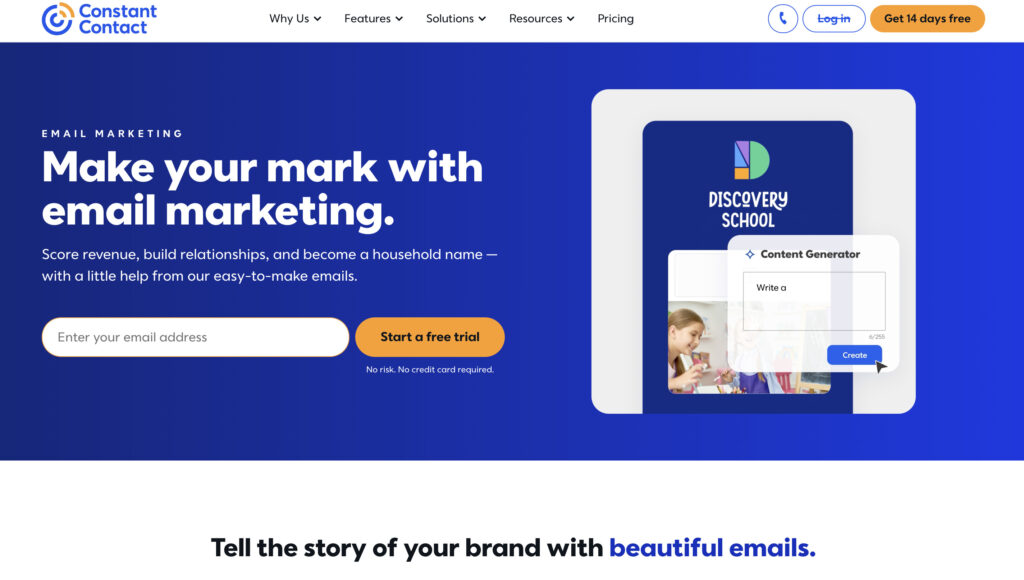
What I Like
- The drag-and-drop email editor is intuitive
- Comprehensive all-in-one platform
- A large collection of mobile-responsive email templates
- AI tools that help with content creation
- Offers niche features, such as event marketing tools
What I Dislike
- Limited automation
- A/B testing limitations
- Basic contact segmentation features
Klaviyo
Klaviyo is one of the most powerful platforms for ecommerce companies. It’s geared toward brands that want to build long-term customer relationships.
Its Data Platform (KDP) unifies customer data from integrations and APIs. This allows marketers to build highly detailed customer profiles and segment audiences. As a result, brands can deliver real-time personalization across email, SMS, and mobile push.
The AI capabilities of Klaviyo also stand out. Smart Send Time, automated deliverability repair, AI product recommendations, and flow creation take away much of the guesswork in campaign management. Marketers can then work fast, not compromising on quality, with customizable templates and a drag-and-drop editor.

What I Like
- Purpose-built for e-commerce. It integrates with major platforms like Shopify, BigCommerce, and WooCommerce, and automatically syncs customer data, purchase history, and product catalogs
- Klaviyo’s visual flow builder is one of the most powerful and flexible
- Natively integrates SMS and web push notifications into its automation flows
- Predictive AI and analytics
- Revenue-focused reporting
What I Dislike
- High and complex pricing
- Steep learning curve
- Limited landing page builder
Conclusion
Of course, if you’re aiming for the very best in performance, these tools stand out. With advanced data-driven personalization and multi-channel automation, they represent the cutting edge of what email marketing can achieve.
Frequently Asked Questions



